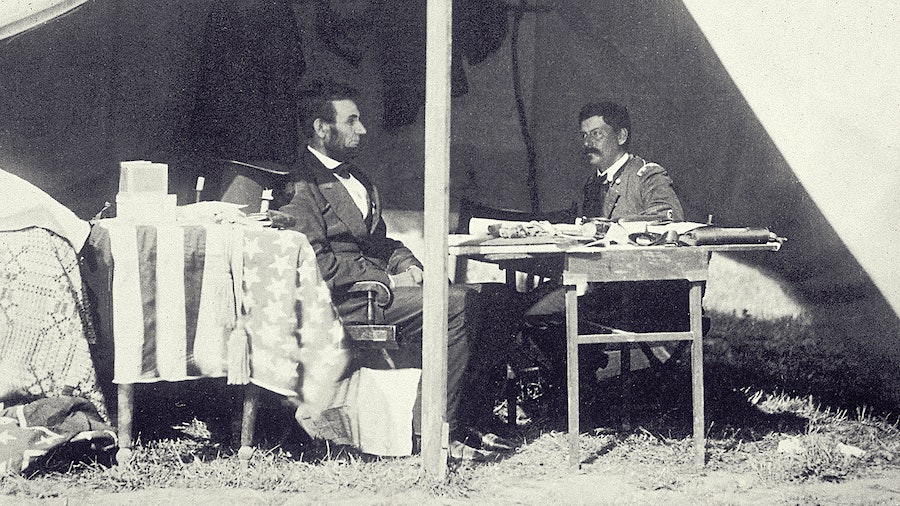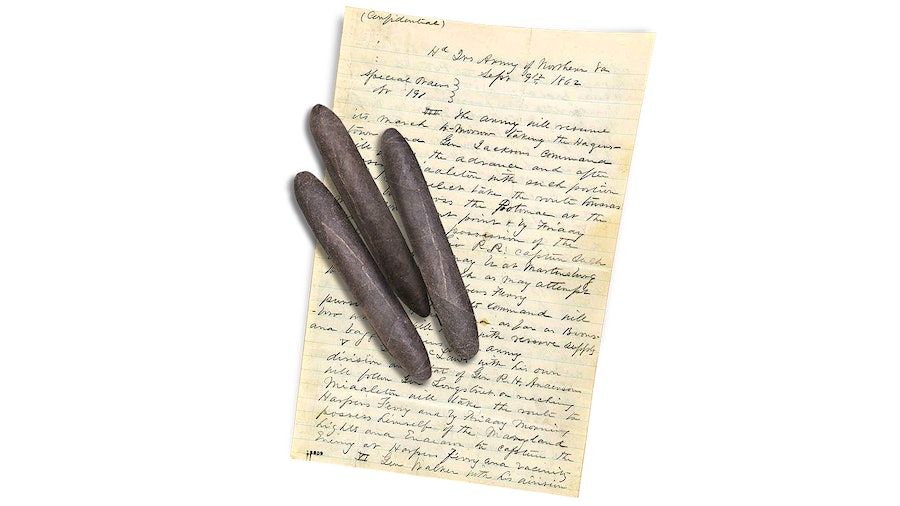Cigars And The Turning Of The Civil War

Union Gen. George McClellan could barely contain himself in a telegram sent to President Lincoln. It was September 13, 1862, and the president had wired the day prior, concerned about Confederate Gen. Stonewall Jackson, who was crossing the Potomac upstream at Williamsport, Maryland, not far from McClellan’s position. “Please do not let him get off without being hurt,” Lincoln had urged.
“I have the whole rebel force in front of me,” McClellan replied. “I think Lee has made a gross mistake, and that he will be severely punished for it. . . . I have all the plans of the rebels and will catch them in their own trap if my men are equal to the emergency. I now feel that I can count on them as of old. My respects to Mrs. Lincoln . . .”
The breathless exuberance of his message was unmatched by anything he’d sent before. With good reason. That morning, McClellan had arrived with Union forces in Frederick, Maryland. Soldiers from his 27th Indiana Infantry Regiment found a shady resting spot along a fence line in a farm meadow where a division of Confederates had encamped just days before. Sitting down to boil their coffee, Sgt. John M. Bloss and Corp. Barton W. Mitchell were relaxing when Mitchell noticed a bulky envelope in the grass. He picked it up. Inside were three cigars, wrapped in an official looking document, which read: “Headquarters, Army of Northern Virginia, Special Orders, No. 191.” It was dated September 9.
The document detailed the Confederate marching orders. No account exists of the kinds of cigars enclosed or what become of them, but the document traveled up the chain of command. Gen. Samuel Pittman recognized the stately handwriting as that of a colleague from the prewar army, Robert Chilton, the adjutant general to Robert E. Lee, who commanded the Army of Northern Virginia, the most powerful of the Confederate forces. Upon seeing how the Southern army would be split into five divisions and spaced about eight miles apart over a 30-mile area along the Potomac River, McClellan gloated: “Now I know what to do. Here is a paper with which if I cannot whip Bobby Lee, I will be willing to go home.”
It’s a mystery how the copy was lost. On September 9, Chilton made six copies of Special Orders No. 191 at army headquarters for delivery to the Confederate leaders. It was routine for couriers to deliver them; almost an entire army was then encamped in the immediate vicinity of Frederick. One theory, according to Joseph Glatthaar, author of General Lee’s Army, is that the copy wrapped around cigars may have fallen out of an officer’s pocket.
What happened next is no mystery. Momentum favored the Confederates, as Lee, fresh off a victory at Second Bull Run in Virginia—where the Union had suffered more than 13,000 casualties to the Confederates’ 8,000—marched his army, 55,000 strong into Maryland on September 3. Lee told Jefferson Davis, President of the Confederate States, that the best chance for victory was to strike again while the enemy was “weakened and demoralized.” He also believed that many southerners viewed Maryland as a slave state eager to join the Confederacy. Four days after the cigar find, on September 17, the Battle of Antietam (known in the south as the Battle of Sharpsburg) commenced in Sharpsburg, Maryland.
For historians, the mere mention of Antietam conjures up the bloodiest single day of warfare in American history, when more than 22,000 Northern and Southern troops were killed or wounded. The disposition of that battle was changed by the plans found with the trio of cigars. According to Civil War historian Bruce Catton, no general before McClellan “was ever given so fair a chance to destroy the opposing army one piece at a time.”
Fortune had shifted. It’s debatable whether McClellan seized the advantage provided to him by hitting what James McPherson called “the all-time military jackpot” in his book Battle Cry of Freedom: The Civil War Era. Despite his message to Lincoln that “No time shall be lost,” it took 18 hours before his troops were on the move. He was notorious for overestimating the size of the enemy, sometimes by multiples of two or three. “Within his illusionary world he forever faced a superior foe,” wrote historian Stephen Sears, explaining McClellan’s psyche in Landscape Turned Red: The Battle of Antietam. Consequently, McClellan rated caution over aggression, even when given an advantage. It’s easy to paint him as the opposite of his adversary Lee, ever the risk taker. “He was afraid to risk failure, so he risked nothing,” wrote McPherson.
McClellan was just 12 miles from the nearest Confederate Division at South Mountain in Maryland. With a superior force (perhaps three times larger than his enemy’s) McClellan first attacked on South Mountain. Three days later, the battle was over. Corpses lay on top of corpses. A Union lieutenant in charge of a burial party, where his regiment (57th New York) fought, described the dead “in every state of mutilation, sans arms, sans legs, heads, and intestines, and in greater number than on any field we have seen before.”
Lee retreated across the Potomac, back to the South. Lincoln had telegraphed McClellan before: “God bless you, and all with you. Destroy the rebel army, if possible.” But McClellan, believing the enemy outnumbered him and still beset by caution, didn’t pursue Lee. Instead, he basked in the glow of victory. “Those in whose judgment I rely,” he wrote his wife, “tell me that I fought the battle splendidly and that it was a masterpiece of art . . . I feel some little pride in having, with a beaten and demoralized army, defeated Lee so utterly . . . Well, one of these days history will I trust do me justice.” But McClellan’s refusal to deliver a decisive blow to a desperately wounded enemy so angered Lincoln that he eventually fired the general. Ultimately, Ulysses S. Grant would take over for the North.
Yet McClellan’s performance on the field in Maryland changed the direction of the war. Because of Antietam, and Lee’s inability to take the war to the North, England and France would not recognize the Confederate States as a nation. The result also allowed Lincoln to issue an Emancipation Proclamation just days later, on September 22, 1862. He had been reluctant to do so earlier because of the series of Southern victories. The Battle of Antietam did not yield as complete a victory as Lincoln desired, but the Confederate invaders had been turned back. “God had decided this question in favor of the slaves,” Lincoln said afterward. He then read the draft of his preliminary Emancipation Proclamation. Unless those states in rebellion returned to the Union within the next 100 days, on January 1, 1863, all persons held in bondage in those states “shall be then, thenceforward, and forever free.” Cigars had played a part in the victory and the Proclamation.






